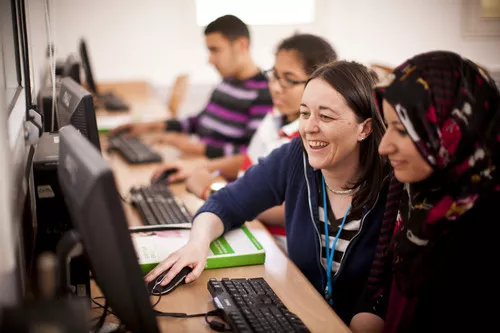In this section you can find useful professional development resources – including articles, webinars, podcast episodes, research and teaching tips and tools – all to help you develop your skills and knowledge of Using digital technologies.
What does 'Using digital technologies' involve?
This professional practice includes identifying and describing the possibilities for using digital pedagogies and digital technologies in your context, taking into account access to devices (e.g. locally, institutionally, girls' access vs boys' access) and the internet.
Digital pedagogies
Using digital pedagogies involves:
developing my awareness of the growing range of (critical) digital pedagogies available and considering these for my context (e.g. mobile learning, hybrid and blended learning, flipped learning)
critically evaluating the reliability of digital sources and the potential effectiveness and appropriacy of digital content for achieving desired learning outcomes, for providing feedback and for assessment
developing effective strategies for locating digital content within a safe environment
following guidelines for e-safety, data protection and ethical approaches to digital technologies
setting up activities and tasks that support learning by exploiting appropriate digital content, tools and platforms
working with your learners to develop their skills in using technology safely for analysing sources and evaluating algorithmic biases
promoting autonomous learning and learner agency by exploiting digital content and technologies inside and outside the formal learning environment
promoting collaborative and participatory learning by exploiting online communities, tools and platforms.
Digital technologies
Using digital technologies involves:
developing a critical understanding of the increasing range of technologies that can be used to support teaching and learning (e.g. generative artificial intelligence, augmented reality, virtual reality, apps, laptops, tablets, mobile phones, interactive whiteboards)
evaluating the effectiveness of digital tools and platforms
developing strategies for locating suitable digital tools and platforms
using technology (e.g. generative AI, adaptive learning tools, assistive technologies) in the production of teaching and learning materials
developing your own and your learners' critical digital literacy (e.g. create, manage and communicate information, e-safety, identifying misinformation)
developing effective strategies for resolving potential technical issues
reflecting on my ability to use digital pedagogies and digital technologies effectively in my context.



